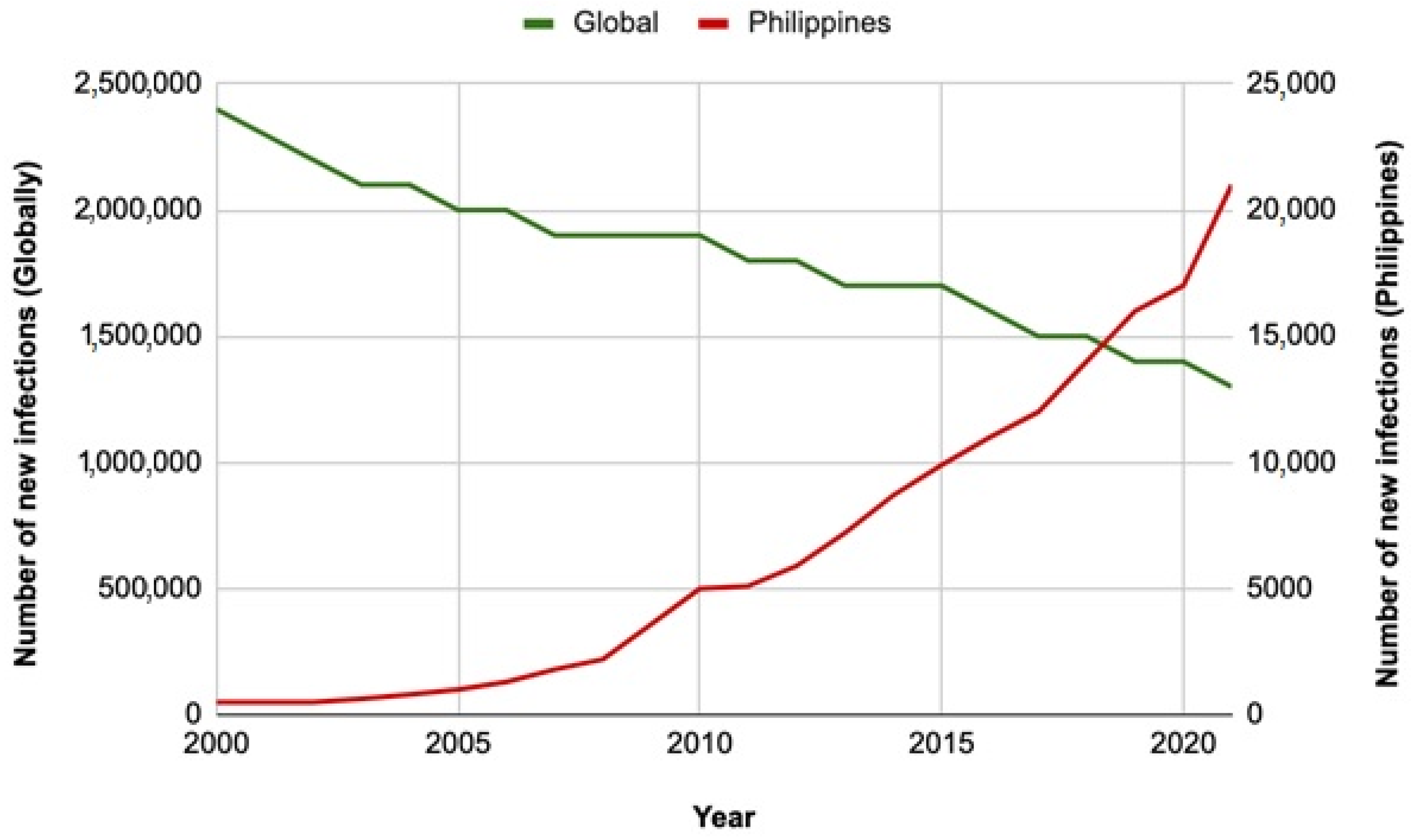Sexual Health Check-Up Before-While-After Visiting Girls in Philippines
3759
Philippines Travel - Sexual Health Tips when Meeting Beautiful Filipino Women

PULSE Sexual Health | Sexual Health Check-Up Before-While-After Visiting girls in Philippines
Planning to go to the Philippines?
 Beautiful Filipino Girls
Beautiful Filipino Girls
The Philippines is renowned for stunning women. Filipinas are known for their beauty and grace, from their warm smiles to their charming personalities. Whether you're interested in meeting pinay girls, dating, or simply making new friends, it's essential to understand the cultural context and respect the women you encounter.
Population of the Philippines
The Philippines has a population of over 110 million, a number that reflects its rich culture and youthful energy. The country’s population is predominantly young, which adds a dynamic quality to its social fabric. Whether you're in a buzzy urban center or a quiet rural area, you'll notice the liveliness and warmth of the people.
However, with such a large and socially active population, it's important to consider the public health implications, particularly regarding sexual health. Awareness and education about these issues are vital, especially in a country where social interaction is a significant part of daily life. Understanding the population dynamics of the Philippines not only enhances your appreciation of its culture but also highlights the importance of staying informed and responsible in matters of health.
HIV Incidence in the Philippines
In recent years, the Philippines has experienced a significant surge in HIV infections, making it one of the fastest-growing HIV epidemics in Asia. This alarming trend highlights the importance of understanding the risks and taking preventive measures, particularly for those engaging with Filipino women.
According to a 2023 study, the daily incidence of new HIV cases in the Philippines has increased by 411% from 2012 to 2023. This sharp rise contrasts with the global trend, where HIV incidence and AIDS-related deaths are generally on the decline. A significant portion of new cases in the Philippines is among young men who have sex with men (MSM), who are disproportionately affected by the epidemic.
Several factors contribute to this rise, including late diagnosis, with 29% of new HIV cases presenting advanced stages of the disease at the time of diagnosis. The country has taken steps to address the epidemic, such as expanding HIV testing and treatment access under the Philippine HIV and AIDS Policy Act of 2018. However, barriers such as stigma, limited harm reduction services, and sociocultural factors continue to hinder progress.
For more detailed information, please refer to our source: Tropical Medicine and Infectious Disease Journal for comprehensive insights into the current state of the HIV epidemic in the Philippines.
Most Common STDs in the Philippines that You Should Be Aware of
Sexually transmitted diseases (STDs) represent a significant and growing public health issue in the Philippines. The most common STDs in the country include chlamydia, gonorrhea, syphilis, and herpes. Understanding the prevalence and risks associated with these infections is crucial for both residents and visitors, especially given the rising rates of these infections in recent years.
A study published in the Journal of Infection and Public Health in 2022 highlights that the incidence of STDs has been steadily increasing in the Philippines over the past decade. The study points to several factors contributing to this trend, including a lack of comprehensive sexual education, limited access to healthcare services, and cultural stigmas surrounding sexual health. In particular, young adults and men who have sex with men (MSM) are disproportionately affected by these infections.
Chlamydia and Gonorrhea are among the most prevalent STDs in the Philippines. These bacterial infections, if left untreated, can lead to severe complications, including infertility and increased susceptibility to HIV infection. Syphilis, another common STD, has seen a resurgence in recent years, particularly in urban areas. Syphilis can have serious long-term health consequences if not diagnosed and treated promptly. Herpes, a viral infection, remains widespread and poses lifelong management challenges due to its recurrent nature.
Preventive measures, including regular testing and treatment, are essential for controlling the spread of STDs. The Philippine National STD/AIDS Prevention and Control Program emphasizes the importance of early detection and treatment, particularly in high-risk populations. However, despite these efforts, barriers such as social stigma and the cost of healthcare continue to hinder progress.
For those considering engaging in sexual activity in the Philippines, it is crucial to prioritize your sexual health by getting tested regularly and ensuring that your partner is also aware of their health status. Testing facilities are available throughout the country, and many organizations offer confidential and affordable testing services.
For more detailed information on STD prevalence and prevention strategies in the Philippines, refer to studies like those published in the Journal of Infection and Public Health and reports from the Philippine National STD/AIDS Prevention and Control Program. These sources provide comprehensive insights into the challenges and progress in combating STDs in the region.
Child Prostitution in the Philippines
Child prostitution remains a tragic and deeply concerning issue in the Philippines, despite ongoing efforts to combat this form of exploitation. The problem is particularly severe in urban centers and tourist hotspots, where economic vulnerability, poverty, and social inequality fuel the demand for underage sex work. It is essential to recognize the severity of this issue, understand the legal framework designed to combat it, and ensure that no actions inadvertently contribute to this illicit industry.
According to a report by the United Nations Children's Fund (UNICEF), child prostitution is a widespread issue in the Philippines, affecting tens of thousands of minors. Many children are coerced or forced into prostitution due to dire economic circumstances, family dysfunction, or outright trafficking. The report emphasizes that the most vulnerable populations are those in impoverished urban areas, where children are often exploited by both local and foreign perpetrators.
A study published in the Journal of Child Sexual Abuse further highlights the complexities of this issue. The research outlines how factors such as limited educational opportunities, lack of employment prospects for adults, and the normalization of sexual exploitation in some communities contribute to the persistence of child prostitution. The Philippines’ booming tourism industry, particularly in regions like Metro Manila, Cebu, and Davao, exacerbates the problem by increasing demand.
Legal Framework & Enforcement
The Philippines has established stringent laws against child prostitution, including the Anti-Trafficking in Persons Act of 2003 (Republic Act No. 9208) and the Anti-Child Pornography Act of 2009 (Republic Act No. 9775). These laws provide severe penalties for those who engage in, facilitate, or benefit from child prostitution. The Special Protection of Children Against Abuse, Exploitation, and Discrimination Act (Republic Act No. 7610) also criminalizes various forms of child abuse, including sexual exploitation.
However, despite these legal frameworks, enforcement remains a significant challenge. Corruption, insufficient resources, and the clandestine nature of child prostitution often hinder effective law enforcement. A 2021 study in the International Journal of Law, Crime and Justice notes that while there have been improvements in law enforcement, many cases still go unreported or are inadequately prosecuted, leaving victims without justice and perpetrators unpunished.
Ethical & Social Implications
Engaging in or turning a blind eye to child prostitution is not only illegal but also profoundly unethical. It perpetuates a cycle of abuse and exploitation that can have devastating long-term effects on victims, including physical, psychological, and social harm. The normalization of such behavior also undermines broader efforts to promote gender equality, protect children's rights, and ensure the well-being of vulnerable populations.
Research from the Journal of Human Rights Practice underscores the importance of societal awareness and ethical responsibility in addressing child prostitution. The study suggests that both local communities and international visitors have a role to play in ending this practice. By refusing to engage in any activities that could support the child prostitution industry, individuals contribute to the broader fight against this egregious violation of human rights.
International Organizations
Non-governmental organizations (NGOs) and international bodies are critical in the fight against child prostitution in the Philippines. Organizations such as the International Justice Mission (IJM) and local NGOs work tirelessly to rescue and rehabilitate victims, while also advocating for stronger legal protections and better enforcement of existing laws. Their efforts are supported by international organizations like UNICEF and the United Nations Office on Drugs and Crime (UNODC), which provide funding, expertise, and global advocacy.
A paper published in the Global Health Action Journal highlights the successes and challenges faced by these organizations. The study points out that while there have been significant strides in rescuing victims and raising awareness, the complexity of the issue requires a multi-faceted approach that includes prevention, education, legal reform, and support for survivors.
Child prostitution in the Philippines is a critical issue that demands the attention of both the local and international communities. It is imperative to be aware of the laws, understand the severe consequences of engaging in such activities, and actively support efforts to eradicate this practice. Whether through advocacy, supporting NGOs, or simply making ethical choices while visiting the country, everyone has a role to play in ending child exploitation.
For more detailed studies and data on this issue, refer to sources such as the Journal of Child Sexual Abuse, International Journal of Law, Crime and Justice, and reports by UNICEF and the UNODC. These sources provide comprehensive insights into the ongoing battle against child prostitution in the Philippines.
Have a question you want to talk to us online? Add us on Whatsapp
Where to Get Tested in The Philippines
PULSE Clinic Manila offers a comprehensive range of testing services that cater to your every need with the utmost confidentiality and speed. Whether you're concerned about HIV, STDs, or just need a routine check-up, our expert team provides fast, impressive, and highly confidential services to put your mind at ease.
With us, you’re not just another patient; you’re valued, respected, and taken care of with the highest level of professionalism. Visit us for peace of mind and to stay healthy while you enjoy all that the Philippines has to offer.
For more information or to book an appointment, click 'Book Now' at the top-right corner of your screen or stop by at our clinic. Your health is our priority, and as always, we're here to help not to judge.
Pricelist and Services at PULSE Clinic Manila
TBC
HIV Preventions in the Philippines
Prioritizing HIV prevention is a must, especially if you’re planning to engage in sexual activities.
- PrEP (Pre-exposure prophylaxis)
- This is a daily pill that can drastically reduce your chances of contracting HIV. It’s a great option if you’re looking for an extra layer of protection. PrEP is simple to take and incredibly effective, offering peace of mind even in high-risk situations.
- Condom Use
- Consistently using condoms is one of the most straightforward and reliable methods to prevent HIV and other sexually transmitted diseases. Whether you're a local or a visitor, this should be your go-to for protection.
- Regular Testing
- Knowing your status is crucial. Regular testing allows for early detection and treatment, which is vital in managing HIV. PULSE Clinic Manila offers quick, confidential, and comprehensive testing services. By making testing a regular part of your routine, you can stay informed and take the necessary steps to protect yourself and others.
Whether you’re in the Philippines for a short stay or long-term, PULSE Clinic Manila is here to support you with expert advice. Stay safe, stay informed, and enjoy your time in the Philippines knowing you’ve taken the right steps to protect your health.
HIV Treatment in the Philippines
Early detection plays a significant role in managing HIV effectively, allowing individuals to maintain a high quality of life.
One of the primary treatments available is antiretroviral therapy (ART). This treatment involves taking a combination of HIV medicines every day, which helps control the virus and prevent it from progressing to AIDS. ART is essential because it not only helps those living with HIV maintain their health but also reduces the risk of transmitting the virus to others.
The key to successful treatment is starting as soon as possible after diagnosis. Early initiation of ART has been shown to significantly improve long-term health outcomes and reduce the likelihood of HIV-related complications.
Patients undergoing ART require regular monitoring to ensure the treatment is effective and to adjust the regimen if necessary. This ongoing care is vital for managing potential side effects and ensuring the virus remains suppressed. Regular blood tests and medical check-ups are a standard part of this process, helping healthcare providers to track progress and make any necessary adjustments.
Support doesn't stop at medication; comprehensive care also includes counseling and social support, helping individuals navigate the emotional and social aspects of living with HIV. This holistic approach is essential for maintaining mental well-being and promoting adherence to the treatment plan.
If you or someone you know is living with HIV, it's important to seek out a reliable healthcare provider that offers both the medical treatment and emotional support needed. Engaging with healthcare professionals early and consistently is the best way to manage the condition and live a fulfilling, healthy life.
Contact Us
![]() PULSE Clinic Manila, Philippines info.ph@pulse-clinic.com
PULSE Clinic Manila, Philippines info.ph@pulse-clinic.com Tel: +63 91712454970 or WhatsApp
![]() or LINE official account
or LINE official account ![]()
Can I Get PrEP ONLINE?
We have been helping people getting PrEP easily since 2015. Thousands of people worldwide are protected from HIV and the number of new HIV infections are reducing. Let's live our lives with let worries and give HIV an end! The beginning of new life starts now with PULSE clinic's PrEP online department special service. Just click on the photo below and let us take you to the PrEP online client portal.
Trust PULSE CLINIC to take care of your health like other 45000 people from over 130 countries. We provide discreet professional service with high privacy. Here to help, not to judge.

























